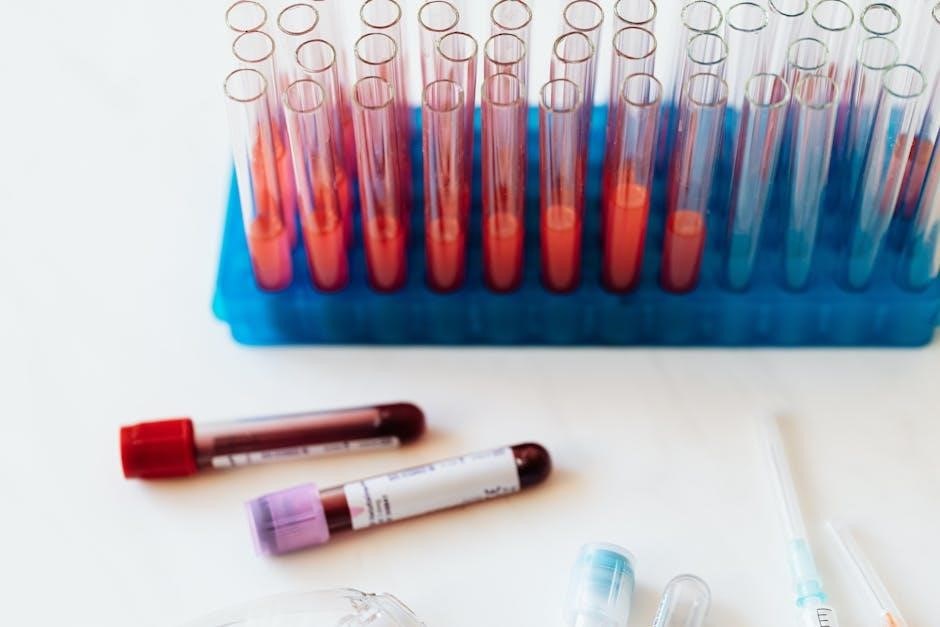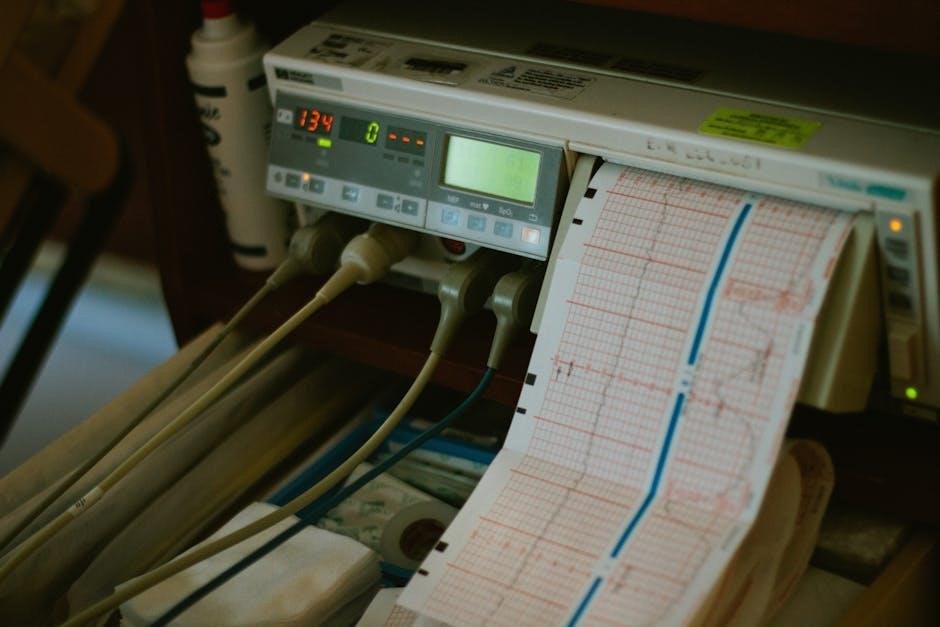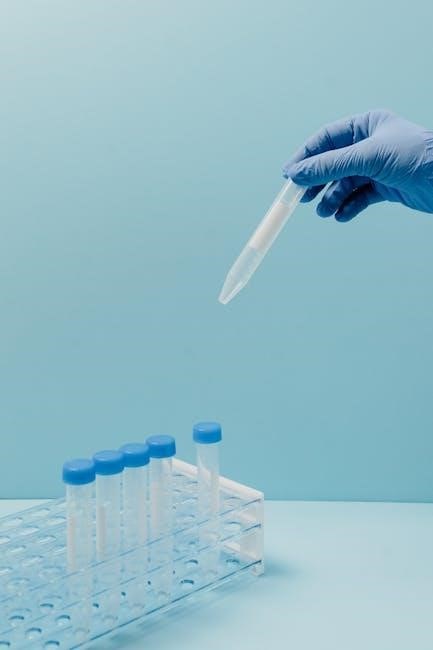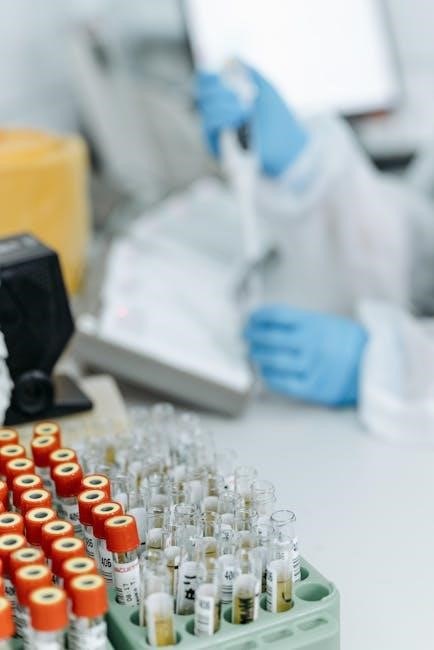
a manual of laboratory and diagnostic tests
Confused by lab results? This manual breaks down diagnostic tests, so you can understand your health like a pro. Get informed now!
This manual serves as a comprehensive guide to laboratory and diagnostic tests. It provides essential information for healthcare professionals‚ covering various clinical laboratory areas like hematology‚ microbiology‚ and clinical biochemistry‚ aiding in accurate diagnosis.
Importance of Accurate Testing
Accurate laboratory and diagnostic testing is paramount in modern healthcare‚ influencing clinical decision-making‚ patient management‚ and overall healthcare outcomes. Reliable test results are crucial for precise diagnoses‚ enabling timely and appropriate treatment interventions. Erroneous results can lead to misdiagnosis‚ delayed treatment‚ or unnecessary interventions‚ potentially harming patients.
Furthermore‚ accurate testing plays a vital role in monitoring disease progression‚ assessing treatment efficacy‚ and preventing the spread of infectious diseases. Quality control measures‚ standardized procedures‚ and proficient laboratory personnel are essential to ensure the accuracy and reliability of test results. This manual emphasizes the significance of adhering to best practices in laboratory testing to minimize errors and optimize patient care. It serves as a practical guide to help professionals navigate the complexities of diagnostic testing.
Scope of the Manual
This manual offers a detailed overview of commonly used laboratory and diagnostic tests‚ encompassing various medical disciplines. It covers hematology‚ including complete blood counts and blood smear examinations‚ clinical biochemistry with liver and kidney function tests‚ microbiology focusing on bacterial culture and sensitivity‚ and immunology featuring autoantibody and allergy testing. Each section provides a concise description of the test principles.
It highlights clinical applications‚ and interpretation of results. The manual also includes information on quality control‚ troubleshooting common issues‚ and relevant safety considerations. This resource is designed for medical laboratory technicians‚ students‚ and healthcare professionals seeking a practical guide to understanding and performing diagnostic tests. It aims to promote accurate and reliable testing practices.

Hematology Tests
This section details hematology tests‚ crucial for blood disorder diagnosis. It covers procedures like complete blood counts (CBC)‚ evaluating cell populations‚ and blood smear examinations‚ assessing cell morphology under microscopic scrutiny.
Complete Blood Count (CBC)
The Complete Blood Count (CBC) is a fundamental hematological test providing a comprehensive overview of blood cell composition. It evaluates red blood cells (RBCs)‚ white blood cells (WBCs)‚ and platelets‚ offering vital insights into a patient’s health. RBC indices such as hemoglobin‚ hematocrit‚ and RBC count are assessed to detect anemia or polycythemia. WBC differential identifies and quantifies different WBC types‚ aiding in infection or inflammation diagnosis. Platelet count is crucial for assessing bleeding disorders.
The CBC is often performed using automated hematology analyzers‚ ensuring accuracy and efficiency. Abnormal CBC results necessitate further investigation‚ including blood smear examination. This test is indispensable in diagnosing various conditions‚ from infections and anemias to leukemia. Understanding CBC parameters is essential for interpreting results and guiding clinical decisions. The CBC serves as a cornerstone in patient evaluation‚ facilitating prompt and effective treatment strategies.
Blood Smear Examination
A Blood Smear Examination involves the microscopic evaluation of a blood film‚ providing detailed information beyond automated cell counts. It allows for assessing cell morphology‚ detecting abnormalities not identified by automated analyzers. The smear is prepared by spreading a drop of blood on a slide‚ staining it to visualize cellular components. Trained personnel examine the smear‚ identifying and characterizing red blood cells‚ white blood cells‚ and platelets.
RBC morphology includes size‚ shape‚ color variations‚ detecting conditions such as spherocytosis‚ sickle cell anemia‚ or iron deficiency. WBC differential count confirms automated results‚ identifying abnormal cells like blasts. Platelet assessment includes estimating platelet count‚ evaluating size‚ and detecting clumping. Blood smear examination is crucial in diagnosing hematological disorders‚ infections‚ and malignancies. It complements automated cell counts‚ providing valuable information for accurate diagnosis and treatment monitoring. It remains a vital tool in clinical hematology‚ requiring expertise in cell morphology interpretation.

Clinical Biochemistry Tests
Clinical Biochemistry Tests analyze blood and other bodily fluids to assess organ function and detect diseases. These tests cover a broad spectrum‚ including liver and kidney function‚ electrolyte balance‚ and enzyme levels.
Liver Function Tests (LFTs)
Liver Function Tests (LFTs) are crucial for evaluating the health and functionality of the liver. These tests measure various enzymes‚ proteins‚ and substances produced or processed by the liver‚ providing insights into its condition. Key LFTs include Alanine Aminotransferase (ALT) and Aspartate Aminotransferase (AST)‚ which indicate liver cell damage. Alkaline Phosphatase (ALP) can suggest bile duct obstruction. Bilirubin levels reflect the liver’s ability to process waste. Albumin measures the protein synthesis capacity.
Abnormal LFT results may indicate hepatitis‚ cirrhosis‚ drug-induced liver injury‚ or other liver disorders. Understanding LFTs is essential for diagnosing and monitoring liver diseases‚ guiding treatment decisions‚ and assessing overall liver health. Consistent monitoring and interpretation of these tests are vital for effective patient care and management of liver-related conditions‚ aiding early detection and intervention.
Kidney Function Tests (KFTs)
Kidney Function Tests (KFTs) are essential for assessing renal health and detecting kidney-related disorders. These tests evaluate the kidneys’ ability to filter waste‚ maintain electrolyte balance‚ and regulate fluid levels. Key KFTs include serum creatinine‚ which indicates kidney filtration rate‚ and blood urea nitrogen (BUN)‚ reflecting waste product accumulation. The glomerular filtration rate (GFR) estimates kidney function. Electrolyte levels‚ like sodium and potassium‚ are also measured to assess kidney’s regulatory capabilities.
Abnormal KFT results may indicate acute kidney injury‚ chronic kidney disease‚ or other renal conditions. Regular monitoring of KFTs is crucial for diagnosing‚ managing‚ and preventing kidney diseases‚ guiding treatment strategies. Accurate interpretation of KFT results is vital for effective patient care‚ ensuring timely intervention and improved outcomes in individuals with kidney-related concerns‚ promoting overall well-being and health.

Microbiology Tests
Microbiology tests are crucial for identifying infectious agents like bacteria‚ viruses‚ and fungi. These tests guide treatment by determining the specific organism causing an infection and its susceptibility to antimicrobials.
Bacterial Culture and Sensitivity
Bacterial culture and sensitivity testing is a cornerstone of diagnostic microbiology; It involves growing bacteria from a patient sample to identify the specific organism causing an infection. This process is essential for accurate diagnosis and targeted treatment.
The culture component allows for the isolation and identification of bacterial pathogens. Once a pathogen is identified‚ sensitivity testing is performed to determine which antibiotics will effectively inhibit or kill the bacteria. This helps clinicians select the most appropriate antibiotic for treatment‚ minimizing the risk of antibiotic resistance.
Understanding bacterial culture and sensitivity is vital for effective management of infectious diseases. It ensures that patients receive the right antibiotic‚ improving outcomes and reducing the spread of resistant organisms‚ as highlighted in various laboratory manuals and diagnostic guides.
Xpert MTB/RIF Assay
The Xpert MTB/RIF assay represents a significant advancement in the diagnosis of tuberculosis (TB). This rapid molecular test detects both the presence of Mycobacterium tuberculosis (MTB) and resistance to rifampicin (RIF)‚ a key first-line anti-TB drug;
The assay utilizes a cartridge-based nucleic acid amplification technique‚ providing results within hours‚ compared to traditional culture methods that can take weeks; This rapid turnaround time allows for earlier diagnosis and initiation of appropriate treatment‚ improving patient outcomes and reducing TB transmission;
The Xpert MTB/RIF assay is particularly valuable in resource-limited settings‚ offering a highly sensitive and specific method for TB detection and drug resistance screening. Its ease of use and rapid results have made it an essential tool in the global fight against tuberculosis‚ as noted in laboratory diagnostics and infectious disease manuals.

Immunology Tests
Immunology tests analyze the body’s immune system. They identify immune deficiencies‚ autoimmune diseases‚ and allergic reactions. These tests are crucial for diagnosing and managing various immunological disorders.
Autoantibody Testing
Autoantibody testing is a crucial aspect of immunological diagnostics‚ focusing on the detection and identification of antibodies that mistakenly target the body’s own tissues and cells. These autoantibodies are hallmarks of autoimmune diseases‚ where the immune system loses its ability to distinguish between self and non-self antigens‚ leading to chronic inflammation and tissue damage.
The presence and specificity of autoantibodies can help clinicians diagnose a wide range of autoimmune conditions‚ including rheumatoid arthritis‚ systemic lupus erythematosus‚ and Hashimoto’s thyroiditis. Different autoantibody tests are available‚ each targeting specific autoantigens associated with particular autoimmune disorders.
Interpreting autoantibody test results requires careful consideration of clinical context‚ as some autoantibodies may be present in healthy individuals at low levels. Therefore‚ a comprehensive evaluation‚ including clinical symptoms and other laboratory findings‚ is essential for accurate diagnosis and management of autoimmune diseases.
Allergy Testing
Allergy testing plays a vital role in identifying specific allergens that trigger adverse immune responses in susceptible individuals. These tests aim to pinpoint the substances responsible for allergic reactions‚ enabling targeted avoidance strategies and appropriate medical management. Common allergy tests include skin prick tests‚ intradermal tests‚ and blood tests that measure allergen-specific IgE antibodies.
Skin prick tests involve introducing small amounts of allergens into the skin through tiny punctures‚ observing for localized reactions like redness and swelling. Intradermal tests are similar but inject allergens deeper into the skin‚ enhancing sensitivity. Blood tests‚ such as the ELISA or RAST assays‚ quantify IgE antibodies specific to particular allergens.
Interpreting allergy test results requires correlation with clinical history‚ as positive results alone do not always indicate clinically significant allergies. Healthcare professionals consider the severity and frequency of allergic symptoms‚ along with test findings‚ to determine the relevance of specific allergens and guide personalized treatment plans.